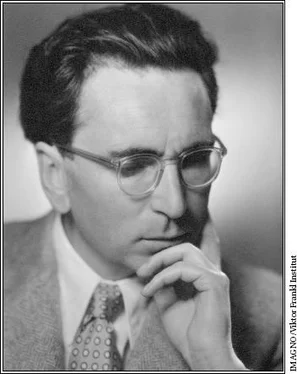In psychiatry there is a certain condition known as “delusion of reprieve.” The condemned man, immediately before his execution, gets the illusion that he might be reprieved at the very last minute. We, too, clung to shreds of hope and believed to the last moment that it would not be so bad. Just the sight of the red cheeks and round faces of those prisoners was a great encouragement. Little did we know then that they formed a specially chosen elite, who for years had been the receiving squad for new transports as they rolled into the station day after day. They took charge of the new arrivals and their luggage, including scarce items and smuggled jewelry. Auschwitz must have been a strange spot in this Europe of the last years of the war. There must have been unique treasures of gold and silver, platinum and diamonds, not only in the huge storehouses but also in the hands of the SS.
Fifteen hundred captives were cooped up in a shed built to accommodate probably two hundred at the most. We were cold and hungry and there was not enough room for everyone to squat on the bare ground, let alone to lie down. One five-ounce piece of bread was our only food in four days. Yet I heard the senior prisoners in charge of the shed bargain with one member of the receiving party about a tie-pin made of platinum and diamonds. Most of the profits would eventually be traded for liquor—schnapps. I do not remember any more just how many thousands of marks were needed to purchase the quantity of schnapps required for a “gay evening,” but I do know that those long-term prisoners needed schnapps. Under such conditions, who could blame them for trying to dope themselves? There was another group of prisoners who got liquor supplied in almost unlimited quantities by the SS: these were the men who were employed in the gas chambers and crematoriums, and who knew very well that one day they would be relieved by a new shift of men, and that they would have to leave their enforced role of executioner and become victims themselves.
Nearly everyone in our transport lived under the illusion that he would be reprieved, that everything would yet be well. We did not realize the meaning behind the scene that was to follow presently. We were told to leave our luggage in the train and to fall into two lines—women on one side, men on the other—in order to file past a senior SS offcer. Surprisingly enough, I had the courage to hide my haversack under my coat. My line filed past the offcer, man by man. I realized that it would be dangerous if the offcer spotted my bag. He would at least knock me down; I knew that from previous experience. Instinctively, I straightened on approaching the offcer, so that he would not notice my heavy load. Then I was face to face with him. He was a tall man who looked slim and fit in his spotless uniform. What a contrast to us, who were untidy and grimy after our long journey! He had assumed an attitude of careless ease, supporting his right elbow with his left hand. His right hand was lifted, and with the forefinger of that hand he pointed very leisurely to the right or to the left. None of us had the slightest idea of the sinister meaning behind that little movement of a man’s finger, pointing now to the right and now to the left, but far more frequently to the left.
It was my turn. Somebody whispered to me that to be sent to the right side would mean work, the way to the left being for the sick and those incapable of work, who would be sent to a special camp. I just waited for things to take their course, the first of many such times to come. My haversack weighed me down a bit to the left, but I made an effort to walk upright. The SS man looked me over, appeared to hesitate, then put both his hands on my shoulders. I tried very hard to look smart, and he turned my shoulders very slowly until I faced right, and I moved over to that side.
The significance of the finger game was explained to us in the evening. It was the first selection, the first verdict made on our existence or non-existence. For the great majority of our transport, about 90 percent, it meant death. Their sentence was carried out within the next few hours. Those who were sent to the left were marched from the station straight to the crematorium. This building, as I was told by someone who worked there, had the word “bath” written over its doors in several European languages. On entering, each prisoner was handed a piece of soap, and then—but mercifully I do not need to describe the events which followed. Many accounts have been written about this horror.
We who were saved, the minority of our transport, found out the truth in the evening. I inquired from prisoners who had been there for some time where my colleague and friend P—— had been sent.
“Was he sent to the left side?”
“Yes,” I replied.
“Then you can see him there,” I was told.
“Where?” A hand pointed to the chimney a few hundred yards off, which was sending a column of flame up into the grey sky of Poland. It dissolved into a sinister cloud of smoke.
“That’s where your friend is, floating up to Heaven,” was the answer. But I still did not understand until the truth was explained to me in plain words.
But I am telling things out of their turn. From a psychological point of view, we had a long, long way in front of us from the break of that dawn at the station until our first night’s rest at the camp.
Escorted by SS guards with loaded guns, we were made to run from the station, past electrically charged barbed wire, through the camp, to the cleansing station; for those of us who had passed the first selection, this was a real bath. Again our illusion of reprieve found confirmation. The SS men seemed almost charming. Soon we found out their reason. They were nice to us as long as they saw watches on our wrists and could persuade us in well-meaning tones to hand them over. Would we not have to hand over all our possessions anyway, and why should not that relatively nice person have the watch? Maybe one day he would do one a good turn.
We waited in a shed which seemed to be the anteroom to the disinfecting chamber. SS men appeared and spread out blankets into which we had to throw all our possessions, all our watches and jewelry. There were still naïve prisoners among us who asked, to the amusement of the more seasoned ones who were there as helpers, if they could not keep a wedding ring, a medal or a good-luck piece. No one could yet grasp the fact that everything would be taken away.
I tried to take one of the old prisoners into my confidence. Approaching him furtively, I pointed to the roll of paper in the inner pocket of my coat and said, “Look, this is the manuscript of a scientific book. I know what you will say; that I should be grateful to escape with my life, that that should be all I can expect of fate. But I cannot help myself. I must keep this manuscript at all costs; it contains my life’s work. Do you understand that?”
Yes, he was beginning to understand. A grin spread slowly over his face, first piteous, then more amused, mocking, insulting, until he bellowed one word at me in answer to my question, a word that was ever present in the vocabulary of the camp inmates: “Shit!” At that moment I saw the plain truth and did what marked the culminating point of the first phase of my psychological reaction: I struck out my whole former life.
Suddenly there was a stir among my fellow travelers, who had been standing about with pale, frightened faces, helplessly debating. Again we heard the hoarsely shouted commands. We were driven with blows into the immediate anteroom of the bath. There we assembled around an SS man who waited until we had all arrived. Then he said, “I will give you two minutes, and I shall time you by my watch. In these two minutes you will get fully undressed and drop everything on the floor where you are standing. You will take nothing with you except your shoes, your belt or suspenders, and possibly a truss. I am starting to count—now!”
Читать дальше












